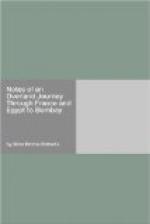The fishermen, like those of Europe, leave the sale of their fish to their wives, who are said to be a busy, bustling, active race, quite equal to the tasks which devolve upon them, and, in consequence of the command which their occupation gives them over the pecuniary receipts of the house, exerting a proportionate degree of authority.
Fishermen’s huts, though very picturesque, are not usually remarkable for their neatness or their cleanliness, and those of Bombay form no exception to their general appearance. They are usually surrounded by a crowd of amphibious animals, in the shape of tribes of children, who for the most part are perfectly free from the incumbrance of drapery. Many, who have not a single rag to cover them, are, notwithstanding, adorned with gold or silver ornaments, and some ingeniously transform a pocket-handkerchief into a toga, or mantle, by tying two ends round the throat, and leaving the remainder to float down behind, so that they are well covered on one side, and perfectly bare on the other. Amid the freaks of costume exhibited at Bombay, an undue preference seems to be given to the upper portion of the person, which is frequently well covered by a warm jacket with long sleeves, while the lower limbs are entirely unclad.
There is said to be cotton goods to the amount of a million sterling lying in the godowns and warehouses of Bombay, unemployed, in consequence of the stoppage of the China trade, and it seems a pity that the multitudes who wear gold chains about their necks, and gold ear-rings in their ears, could not be prevailed upon to exchange a part of this metal for a few yards of covering of some kind or other, of which apparently they stand much in need.
Great numbers of the poorer classes seem to be ill-fed, ill-lodged, and worse clothed; yet scantiness in this particular is certainly not always the result of poverty, as the redundance of precious ornaments above mentioned can witness. Neither does the wretched manner in which many belonging to the lower orders of Bombay shelter themselves from the elements appear to be an absolute necessity, and it is a pity that some regulations should not be made to substitute a better method of constructing the sheds in which so many poor people find a dwelling-place. The precaution of raising the floor even a few inches above the ground is not observed in these miserable hovels, and their inhabitants, often destitute of bedsteads, sleep with nothing but a mat, and perhaps not even that, between them and the bare earth.
At this season of the year, when no rain falls, the palm-branches with which these huts are thatched are so carelessly placed, as to present large apertures, which expose the inmates to sun-beams and to dews, both of which, so freely admitted into a dwelling, cannot fail to produce the most injurious effects. Were these houses raised a foot or two from the ground, and well roofed with the dry palm-branches, which seem to supply so cheap and efficient a material, they would prove no despicable abodes in a country in which only at one season of the year, the rains, very substantial shelter is required.




